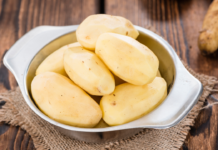Sponsored by: Renadyl™
Celebrating the holidays with friends, family, and loved ones can bring so much joy to one’s life. The food, laughter, and holiday spirit can be so exciting and fun! Unfortunately, all that fun can also bring stress and overwhelm, especially when it comes to eating with chronic kidney disease during the holidays. There are so many things to keep in mind during the holidays with CKD, but keeping your gut healthy should be of utmost importance. Keeping your gut healthy during a stressful time, like the holiday season, can help you feel better & help to protect your kidneys in the long run.
Stress and the kidneys
Stress manifests differently in everyone, and it’s something that we all deal with in different ways. Recent studies show that stress can adversely affect the kidneys and even further the progression of CKD. This is a big deal for those with CKD because slowing the progression of kidney disease can help minimize your CKD symptoms. This also shows that managing stress is more important now than ever. According to a study from 2016, 62% of individuals feel increased stress levels during the holidays. With the holidays fast approaching, we know that our stress levels may only increase from here, so taking your stress into your own hands is crucial.
The good news is that many stress management techniques can also help manage CKD. Physical activity, meditation, deep breathing, adequate sleep, mindfulness, and increased intake of fruits and vegetables have all been shown to help decrease stress levels. Having many stressors in your life can feel so overwhelming, but tackling one stressor at a time can feel more doable for some. Try choosing one technique to help manage your stress levels this holiday season and see how you feel. Maybe you go for a walk with your family after eating your Thanksgiving dinner, or be sure to include more fruits and vegetables on your plate. Choose a method of managing stress that works best for your lifestyle.
Stress and your gut health
Stress and gut health go hand in hand, especially during the holiday season. Why? Stress has been shown to alter the composition of gut bacteria. When this happens, gut bacteria release toxins and metabolites that can negatively affect our mood and behavior. Studies show one may be more likely to experience depression when this occurs, but that probiotics can help lessen the feelings of depression. More research is needed on this topic; however, this news is promising.
How can you help protect your gut health with CKD when you feel stressed?
Techniques for managing CKD, stress & gut are actually all quite similar. Some examples include: eating a well-balanced kidney-friendly diet, regular physical activity, getting adequate sleep, and ensuring you get pre/probiotics. Prebiotics are a food that promotes the growth of good gut bacteria called probiotics. It is important to have a good mix of both pre/probiotics so you can continue to feed and replenish the good gut bacteria in your body.
Pre/probiotics are found in both foods and supplements, like Renadyl and Kibow Fortis. Foods rich in prebiotics are chicory root, Jerusalem artichokes, garlic, bananas, onions, leeks, asparagus, barley, oats, and apples. Foods rich in probiotics are yogurt, kefir, tempeh, sauerkraut, kimchi, and miso. Adding some of these foods to your holiday staples can be a great way to make your meals more gut- and kidney-friendly. For example, maybe you typically have roasted broccoli as a side dish on your Thanksgiving table. Instead of broccoli, try roasted asparagus with garlic for a prebiotic boost.
Along with getting pre/probiotics from foods, you can also support good gut health by taking pre/probiotic supplements. This way, you ensure that you get adequate amounts and strains of pre/probiotics for your kidney health. Pre/probiotics like Renadyl and Kibow Fortis are good sources of fiber and beneficial bacteria for your gut. Renadyl is made with three probiotic microbial strains of beneficial bacteria – S.thermophilus (KB19), L.acidophilus (KB27), and B.longum (KB31) – that have been shown to help remove uremic toxins from the body.
During this holiday season, try including pre/probiotic-rich foods in your favorite dishes–or taking pre/probiotic supplements like Renadyl and Kibow Fortis–to help support your stress levels and gut health. Always be sure to check with your doctor and healthcare team first before taking any new supplements.
Learn more about our sponsor Renadyl™ here https://bit.ly/3sZDWbb
About the Author
Kellsey Reed is a kidney dietitian. She helps people with CKD learn to eat the foods they love so they can improve their kidney health and live their best life with CKD. As a registered dietitian who specializes in chronic kidney disease, she has been through extensive training to give you the best support and guidance possible. In her career, she’s seen the lack of support given to those with CKD and is on a mission to change that.
“I don’t believe in just giving you a one-page handout that says “eat this” and “don’t eat that”. I don’t believe in telling you to stop going out to eat! I don’t believe in having you cut out all the foods you love in order to manage your CKD! I believe in giving you all of the tools, resources, and support that you need to eat for your CKD with 100% confidence! I believe in helping you learn how to travel, go out to eat at your favorite restaurants, have a date night with your spouse, and celebrate holidays and birthdays with your family without stress, anxiety, or confusion!”
If you’re interested in learning more about Kellsey’s coaching program or the free resources she offers, go to her website: ckdnutrition.com. You can also follow along on Instagram or TikTok at: @ckd.nutrition.coach!
References
- https://www.ncbi.nlm.nih.gov/pmc/articles/PMC3065426/
- https://www.ncbi.nlm.nih.gov/pmc/articles/PMC7859267/
- https://www.ncbi.nlm.nih.gov/pmc/articles/PMC4871619/
- https://www.ncbi.nlm.nih.gov/pmc/articles/PMC7213601/
*These statements have not been evaluated by the US Food and Drug Administration. This information is not intended to diagnose, treat, cure, or prevent any disease. Always consult with a qualified healthcare professional prior to beginning any diet or exercise program or taking any dietary supplement. The content on our website is for informational and educational purposes only.




